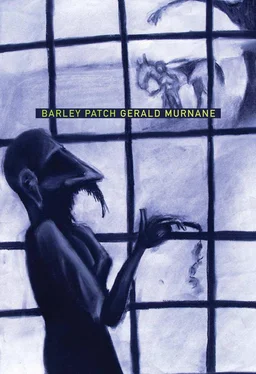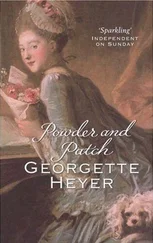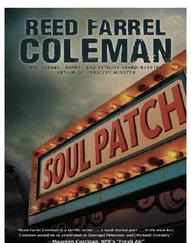Gerald Murnane - Barley Patch
Здесь есть возможность читать онлайн «Gerald Murnane - Barley Patch» весь текст электронной книги совершенно бесплатно (целиком полную версию без сокращений). В некоторых случаях можно слушать аудио, скачать через торрент в формате fb2 и присутствует краткое содержание. Год выпуска: 2011, Издательство: Dalkey Archive Press, Жанр: Современная проза, на английском языке. Описание произведения, (предисловие) а так же отзывы посетителей доступны на портале библиотеки ЛибКат.
- Название:Barley Patch
- Автор:
- Издательство:Dalkey Archive Press
- Жанр:
- Год:2011
- ISBN:нет данных
- Рейтинг книги:5 / 5. Голосов: 1
-
Избранное:Добавить в избранное
- Отзывы:
-
Ваша оценка:
- 100
- 1
- 2
- 3
- 4
- 5
Barley Patch: краткое содержание, описание и аннотация
Предлагаем к чтению аннотацию, описание, краткое содержание или предисловие (зависит от того, что написал сам автор книги «Barley Patch»). Если вы не нашли необходимую информацию о книге — напишите в комментариях, мы постараемся отыскать её.
Barley Patch — читать онлайн бесплатно полную книгу (весь текст) целиком
Ниже представлен текст книги, разбитый по страницам. Система сохранения места последней прочитанной страницы, позволяет с удобством читать онлайн бесплатно книгу «Barley Patch», без необходимости каждый раз заново искать на чём Вы остановились. Поставьте закладку, и сможете в любой момент перейти на страницу, на которой закончили чтение.
Интервал:
Закладка:
Whenever I was told to play in my well-off uncle’s garden, I went first to the flowerbeds at the front. I plucked petals furtively until I had a collection of many colours. Then I hid myself in the fernery and arranged my petals in groups on the concrete stepping-stones so that each group suggested a set of racing-colours that had been described on one or another page in the collection of racebooks belonging to another uncle of mine: my father’s youngest brother, who lived far away in the south-west of Victoria. On winter Sundays, when the garden was bare, I would collect a leaf from every shrub or tree in both the front and the back garden. Afterwards in the fernery, I would chew on leaf after leaf, comparing the flavours. (I did this not only in my well-off uncle’s garden but in most gardens that I visited as a child. A few years ago, I saw in a newspaper article a list of garden plants reputed to be poisonous to human beings. Several on the list were plants that I had chewed and savoured often as a child.)
The fernery, on the less-frequented side of the house, always attracted me. Perhaps some of the trailing leaves reminded me of the potted palms meant to suggest opulence in the line drawings of hotel-foyers or hotel dining-rooms where so-called romantic episodes took place in comic-strips that I had read. Or, perhaps, I responded to the comparative seclusion of the fernery in the same way that I responded whenever I found myself alone in a secluded place or an empty landscape or even whenever I read about such a place or such a landscape — by seeing myself and a young female person alone together in that place or that landscape.
The person I most often saw alone with myself in the fernery would have been one or another of my three girl-cousins, the daughters of the well-off owner of the fernery. The youngest of the three was four years older than myself. None of the three, as I recall, took the least notice of me during my childhood. Two of the three are long dead, and the third I have not met up with for nearly twenty years. Even so, I am able to recall precisely the peculiar attraction that I felt towards each of my three cousins. I never felt towards any of them the sort of yearning that I often felt towards one or another girl of my own age whom I thought of as my girlfriend. That is to say, I never yearned to have a cousin follow me around or spy on me or interrogate me in order to learn my every thought and daydream. Nor did I lie in bed at night trying to see myself with one or another cousin in the far future as husband and wife in a house of two storeys on an extensive rural property. Perhaps my feelings towards my cousins arose partly from my having had no sister and no female friend of my own age during my childhood. My only sibling was a brother five years younger than myself. Moreover, my father’s losses from his betting on racehorses caused us to move from one rented house to another almost every year, so that I always felt myself to be a transient and likely to be soon snatched away from any friend I might make. What I most yearned for my cousins to do was to advise me. I never stood alone in the fernery without the vague hope that one or another cousin would join me there among the trailing greenery and would give me what my mother and my aunt would have called a good talking-to.
My cousin might have told me in the fernery no more than how she spent some of the many hours when I was unable to observe her: what she discussed with her girlfriends at school or with her sisters late at night in the bedroom that they shared. Even this would have been of value to me, who had to put into my girlfriends’ mouths predictable words of my own choosing whenever I tried to foresee our future dealings with each other. I knew there was much more that my cousin might have told me if I could have earned her sympathy, and although I could never formulate any detail of this precious information, I could cause myself to feel sometimes, alone in the fernery, a pleasant dizziness merely by supposing that I might one day hear such stuff from a young female person while she stood so close beside me that I could see the faint hairs on her forearms or the pale freckles just below her neck.
I daydreamed in the fernery only about the three female cousins of mine who lived thereabouts, but in other secluded places images of other female cousins appeared to me and advised me or revealed things to me. My Catholic father and my Protestant mother had each eight siblings. Of my eight paternal uncles and aunts, only three married, and these three together produced eleven children. All eight of my maternal uncles and aunts married and together produced more than forty children. My father was older than most of his siblings, whereas my mother was younger than most of hers. I had hardly any dealings with my cousins on my father’s side, who were mostly much younger than myself. As a boy, I visited many of my cousins on my mother’s side and even stayed sometimes overnight in their homes. Not once during all my childhood did a girl-cousin of mine approach me as though she had in mind any sort of serious discussion between the two of us. A few girl-cousins even gave me to understand that they disliked my company. And yet, for year after year, I remained hopeful. On some or another sweltering afternoon in the coming summer holidays, I would surely find myself alone with a girl-cousin in some or another shed on her parents’ farm. There would be between us such an understanding as had never yet existed between myself and a female person. We would neither of us feel urged to prove ourselves worthy of the other. Nor would we live in fear of losing the other’s regard. Our mood would be relaxed, light-hearted even. Our business together would begin with questions and answers. We would ask at first trivial or even flippant questions, as though nothing was at stake. Later, our questions would be such as had for long bothered us or even tormented us. We would answer each other with frankness, each marvelling at how easily we dispelled doubt after doubt or mystery after mystery. It was always possible that our honesty would oblige us to undress or even to make free with one another’s body, but I never supposed that anything we might do together would be done for any less serious purpose than to learn what it was that our parents and aunts and uncles seemed anxious that we should not learn.
In my well-off uncle’s backyard, I spent most of my time in front of his aviaries, especially the breeding cages. Each of these contained a male-bird and a female-bird and a nest, which was an empty Fisher’s Wax tin that the birds lined with straw and feathers. The nesting-tin was always nailed to the wall of the cage but too high up for me to see into. I often saw part of an adult bird that was sitting in the nest. Sometimes I heard the cries of baby-birds from inside the nest. Sometimes I saw a parent-bird reaching down to feed its young from its own mouth. I never actually saw into a nest. Each breeding-cage had a small door through which a person might have looked into the nest-tin, but the door was always fastened with a padlock. I once asked my uncle if I could look through one of the doors, but he told me that even my looking in on them might cause the birds to abandon their eggs or their young.
My glimpses into my aunt’s kitchen on those Sunday afternoons in the 1950s may have been among the first causes of my aversion during all my later life to meals prepared by persons other than myself. My aunt and her woman-helpers prepared two dishes: a salad and a trifle. The ingredients of the salad seemed to require much handling. Leaves of lettuce had to be folded over and sliced — and then folded and sliced again until they made up a bowl of what was called shredded lettuce. Stray bits of lettuce that clung to the slicers’ palms or got stuck under their fingernails were scraped or plucked free and then dropped into the bowl. Likewise, when a cluster of tomato-seeds fell away from a newly severed slice, the woman-slicer picked up the blob between the knife-blade and two or three fingertips and then dropped the seeds and the adjoining jelly into a bowl where pieces of tomato and discs and hoops of onion were submerged in vinegar. I cannot claim that I was revolted by the preparation of the beetroot, but the sight of the purplish stain from its juice on the tablecloth at mealtime would always remind me of the offensive sights that I had seen from the kitchen doorway during the afternoon. The worst of those sights were of women putting fingers into mouths. Most of the women removed sticky and greasy substances from their fingers by sucking the affected finger and then going on with their work. If even one of the women had wiped her finger afterwards in token fashion on her apron, I might have been able to tell myself later that that particular woman had happened to prepare the portion of salad that I was struggling to swallow, but I never saw any of the women wiping her finger thus.
Читать дальшеИнтервал:
Закладка:
Похожие книги на «Barley Patch»
Представляем Вашему вниманию похожие книги на «Barley Patch» списком для выбора. Мы отобрали схожую по названию и смыслу литературу в надежде предоставить читателям больше вариантов отыскать новые, интересные, ещё непрочитанные произведения.
Обсуждение, отзывы о книге «Barley Patch» и просто собственные мнения читателей. Оставьте ваши комментарии, напишите, что Вы думаете о произведении, его смысле или главных героях. Укажите что конкретно понравилось, а что нет, и почему Вы так считаете.












